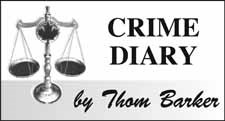Const. Fabrice Georges Gevaudan, Const. Douglas James Larche, Const. Dave Joseph Ross.
For a crime columnist, when events like last week's shootings in New Brunswick occur, there is only one thing to write about, but endless possibilities on what to write about them.
It is really tempting to go down the gun control rabbit hole, but that just seems pointless. There are few issues on which positions are so entrenched, polarized and vitriolic as gun ownership.
It is equally tempting to speculate on what further powers we could bestow upon law enforcement that might prevent future incidents, but a knee-jerk suspension of civil liberties for all of us is not fair. Coincidentally, all of this occurred as the final preparations for celebrations of the 70th anniversary of D-Day were underway. Much has been made since the end of World War II about all the young men who died for our freedom, for a society in which we are not subject to intrusive, authoritarian government.
Then there is the shooter, who, going against all of my journalistic instincts and the simple human imperative to stare in disbelief at scenes of horror, I will not name here because the only names that are important right now are Const. Fabrice Georges Gevaudan, Const. Douglas James Larche and Const. Dave Joseph Ross.
Last week a story appeared on the Internet that Charles Manson was being paroled because of overcrowding in the California prison system. It was a hoax, of course, but it underscored how the perpetrators of unspeakable acts tend to enjoy notoriety in perpetuity while their victims eventually fade into obscurity. Despite how high profile the Manson case was, when the parole hoax emerged, I could only remember the name of one of his victims, Sharon Tate, and only because of her own fame as an actress and wife of director Roman Polanski.
It is an unfortunately reality that years from now, the Moncton shooter's name will be imprinted on Canadian history while we will likely have to look up the names of his victims.
People cannot help but be fascinated, though, with what could possibly break so badly in a person's mind that he could commit such horrific acts. The fields of psychology, psychiatry, sociology, political science and neurology (not a complete list I'm sure) grapple with understanding the psycopathy of these broken individuals in the hope that we may someday be able to predict and proactively intervene before stewing wrath turns into explosive action.
Ultimately, though, how do you deal with crazy? In a free and civil society you can't arrest someone for what they are thinking, even if you could possibly be certain what they are thinking.
In an interview on CBC TV, Wendy Mesley referenced the 2005 killings of four RCMP officers in Mayerthorpe, Alberta and asked RCMP Commissioner Bob Paulson whether the force was adequately prepared for such an incident.
"You can prepare for a monster like this that's walking on our streets," Paulson said. "The facts of Mayerthorpe were significantly different in terms of the recommendations that came out of our study of Mayerthorpe, we've implemented them all, we have hard body armour, we have all the weapons that we need, we've revised all of our policies, how do you guard against a monster like this, it's very very difficult."
Indeed.
It is perhaps inevitable that the individual who shot and killed the three Moncton Mounties will be the name remembered out of all of this.
There will be a very high profile trial. Or maybe not; he might be found criminally not responsible. If so, there will be endless wrangling over the justice of the designation and whether he should also be saddle with "high-risk."
This week, however, it is not about him.
I repeat: Const. Fabrice Georges Gevaudan, Const. Douglas James Larche, Const. Dave Joseph Ross.




